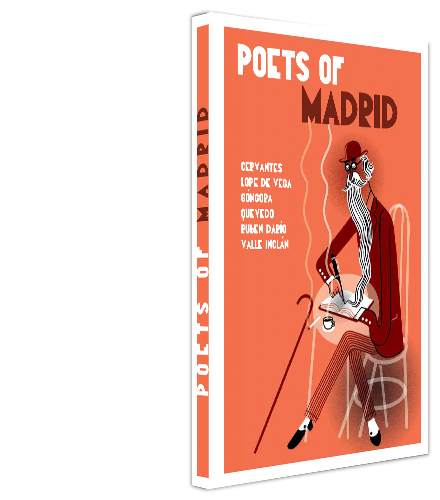Hace ya un tiempo vio la luz una antología de poemas muy especial: Poetas de Madrid. Pues bien, ahora nos hemos atrevido a publicarla en su versión en inglés ante la demanda del lector foráneo. Un lujo de edición que viene a sumarse a su edición en castellano.
Madrid ha sido históricamente una ciudad literaria, pasear por sus calles es pisar por donde anduvieron hace siglos los mejores escritores en español, como Miguel de Cervantes, autor de Don Quijote de la Mancha, la primera novela moderna y la más famosa de la historia; Lope de Vega, creador del arte nuevo de hacer comedia en este tiempo, fórmula teatral que resistió el paso de los siglos convirtieron en el autor de teatro más importante y prolífico del país; los poetas Barroco Luis de Góngora y Francisco de Quevedo, la cumbre de la poesía en España enfrentados poética y vitalmente por sus célebres burlas cruzadas con franca mala baba y su distinta concepción de la poesía, culteranismo y conceptismo; Valle-Inclán, quién concibe la estética literaria más original del siglo XX; y Rubén Darío, figura clave del Modernismo.
Madrid. Homeric city, the cradle and grave of many of us that pour out the joyful days of youth among its streets and wineries. Throughout its histori it has accepted into its fold non-conforming poets from the four corners of the earth, because one is born a poet in his land, but one is made and perishes in Madrid.
No matter where you are from, Madrid never leaves you indifferent, it always offers the rhapsodist who has moved to the capital in search of fortune, a lively space about which to wrtie their verses. If our lives are the rivers as Manrique said, today the Manzanares river has been reborn and is full of life.
Poets of Madrid is a generous title, as is Madrid. This anthology shows that the city drew them in from very distant places: Ruben Darío, for example, was born in Nicaragua; Valle-Inclán in Galicia; Góngora was Andalusian; Cervantes was born in Alcalá de Henares, thirty kilometres from Madrid; only Francisco de Quevedo and Lope de Vega were true Madrid natives. With this, we are trying to say that the presence of Ruben Darío in the anthology represents the percentage of the Hispanic American population who, proud of the city that embraces them, carries the same language in their voices; Góngora and Valle-Inclán, that of the surroundign areas; Cervantes that of the city’s close neighbours; and Lope and Quevedo, that of those born in Madrid. Because those us of from other parts of the globe were attracted to this city, which is no loger a «Manchegan dump», for its courtesy and its lack of rejection; as a place known for its cosmopolitanism should be.









